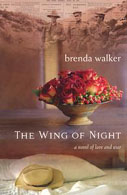 | Reviews of The Wing of Night by Brenda Walker. |
[This novel has been shortlisted for the 2006 Miles Franklin award.]
Description from publisher's page: "All over the south-west, soldiers' wives were learning to sleep alone. Sleeping themselves back into the nights before their weddings . . . In 1915 a troopship of Light Horsemen sails from Fremantle for the Great War. Two women farewell their men: Elizabeth, with her background of careless
wealth, and Bonnie, who is marked by the anxieties of poverty. Neither can predict how the effects of the most brutal fighting at Gallipoli will devastate their lives in the long aftermath of the war.
"The Wing of Night is a novel about the strength and failure of faith and memory, about returned soldiers who become exiles in their own country, about how people may become the very opposite of what they imagined themselves to be. Brenda Walker writes with a terrible grandeur of the grime and drudge of the battlefield, and of how
neither men nor women can be consoled for the wreckage caused by a foreign war."
The literature of this country would be totally lost without the magazine Australian Book Review. Time and again the only substantial review I can find of a particular work appeared within its pages. Such is the case with Brenda Walker's fourth novel The Wing of Night. Aviva Tuffield is very impressed
with the novel, especially as it doesn't concentrate solely on the front line, but "directs as much attention to the home front and to the women left behind...Shifting between scenes from the military theatre and from the domestic sphere, The Wing of Night plays out the devastating impact of war on both those sent to fight and those abandoned to lonely, anxious lives. War is depicted as a great leveller, breaching class and gender boundaries that were once considered robust".
In order to do this properly, the author has to be conversant with both fronts, while still ensuring that the tale is told properly. This is a novel of men, and women, at war, based on accepted history. As such, the writer has to get the details right without flooding the reader and ruining the effect: "This historical novel has clearly emerged from extensive
research, yet it does not try to parade its knowledge or to bombard the reader with military details. It is not concerned with painting the big picture of the war but of sketching the specific experiences of a handful of characters."
Tuffield is of the view that the author here has brought it all together quite beautifully. "If one of the aims of literature is to enable us imaginatively to inhabit other lives, perhaps occurring in different times and places, The Wing of Night is a remarkable achievement. Walker has taken the facts of history and transformed them into a novel replete with its own set of truths. She has done what historians cannot: invented characters to tell us exactly how it felt to live in a particular historical moment, one that sheds light on our own times."
The reviewer from Abbey's Bookshop would seem to agree: "The Wing of Night is a novel about the strength and failure of faith and memory, about returned soldiers who become exiles in their own country, about how people may become the very opposite of what they imagined themselves to be. Brenda Walker writes with a terrible grandeur of the grime and drudge of the battlefield, and of how neither men nor women can be consoled for the wreckage caused by a foreign war."
The author was profiled by Jane Sullivan in "The Age", which gives some very interesting insights into where the book had its beginnings.
